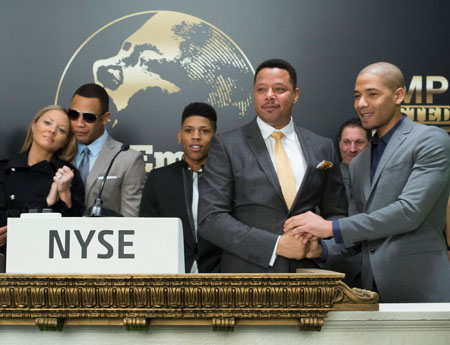Hulu Is Building Its 'Empire'

The smarter way to stay on top of broadcasting and cable industry. Sign up below
You are now subscribed
Your newsletter sign-up was successful
Hulu swooped in and acquired the subscription video-on-demand rights to Fox’s megahit, Empire, with the show airing exclusively on the company’s SVOD platform starting next month.
One of the key reasons Hulu was able to grab the show over rivals Netflix and Amazon was that Hulu will allow Fox Now to stack current episodes of the show while it’s running on the network, while Netflix will not. Empire is currently playing on Fox Now, asking “Wanna Watch Empire From the Beginning?” And the network actively promoted Fox Now during the series’ run, sending viewers there to catch up on episodes they might have missed.
“Netflix was interested but at the end of the day did not play in the deal,” says a distribution executive who preferred to remain unnamed. “Stacking has become a very big issue with respect to Netflix. It’s trying to buy shows on a global basis and it’s trying to pay less if the series has been or will be stacked.”
Netflix also increasingly prefers to acquire shows exclusively. Those are the three big issues that differentiate Netflix from its two main SVOD rivals, Amazon and Hulu.
The per-episode price that Hulu paid for Empire remains undisclosed, but lesser hits—Warner Bros.’ Gotham and Sony Pictures Television’s The Blacklist—both went for around $2 million per episode for domestic distribution. The Gotham deal was global, so Netflix also paid Warner Bros. for rights to Gotham in every territory the distributor serves or plans to serve.
Netflix remains by far the market leader in this space, but with Hulu and Amazon opening their pocketbooks, Netflix has to be careful about which lines it will not cross. For example, if it demands global rights to a show, but the seller determines they can get more money domestically from a rival provider and then sell the international rights to the show itself, the seller might choose not to go with Netflix. That means Netflix could miss out on some hot properties.
In other cases, Hulu and Amazon could both agree to share a property, jointly outbidding Netflix.
The smarter way to stay on top of broadcasting and cable industry. Sign up below
“You do have cases where two platforms are willing to pay to keep it off a third. Still, on some level, if you want the biggest audience possible to build your shows, there is some argument that Netflix remains your best choice,” says David Bank, RBC Capital Markets managing director, equity research.
Empire has been a television phenomenon, making it immediately attractive to providers of TV’s most binge-worthy shows.
The series about a hip-hop dynasty, led by Academy Award-nominees Terrence Howard and Taraji P. Henson, grew its audience over all ten weeks it aired, the first series to have done so in 23 years, according to Fox. It averaged a 7.0 rating/21 share among adults 18- 49 and an average audience of 17.1 million total viewers and is on pace to end the season as the top-rated scripted series, beating CBS’ The Big Bang Theory.
Empire also is by far the top-rated series among diverse audiences, averaging a 32.7 season-to-date rating among African-American adults 18-49. The show’s season finale scored an 8.8 rating among adults 18-49 and a 41.4 rating among African-American adults 18-49, out-rating even the Super Bowl in that demo.
Series quickly hopping to SVOD services after their premiere could spell trouble for cable networks that build their schedules around top-rated off-net programming. Shows that are highly serialized, such as Empire, probably wouldn’t be huge cable draws, but that’s not the case with procedurals, such as CBS’ CSI or NBCUniversal’s Law & Order franchises, which have drawn top dollars from cable networks.
“Networks and distributors both have been cautious about making procedurals available [to SVOD services] early, but that’s still an evolving area,” says the distribution executive. “There has been no procedural breakout in this SVOD era to test that theory.”
Contributing editor Paige Albiniak has been covering the business of television for more than 25 years. She is a longtime contributor to Next TV, Broadcasting + Cable and Multichannel News. She concurrently serves as editorial director for The Global Entertainment Marketing Academy of Arts & Sciences (G.E.M.A.). She has written for such publications as TVNewsCheck, The New York Post, Variety, CBS Watch and more. Albiniak was B+C’s Los Angeles bureau chief from September 2002 to 2004, and an associate editor covering Congress and lobbying for the magazine in Washington, D.C., from January 1997 - September 2002.

